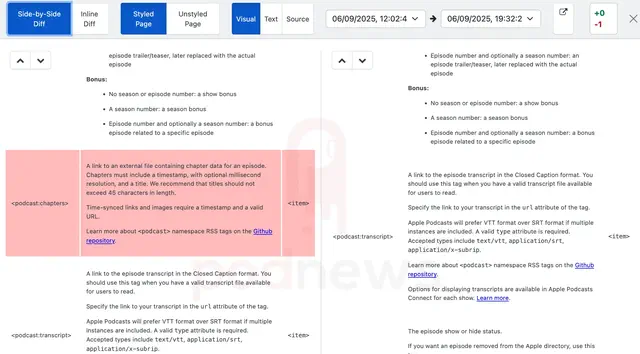Apple Podcasts chapter support: a clue to a new feature?

As Podnews covers today, Apple Podcasts is shortly, it seems, to support the podcast:chapters JSON chapter files that are part of Podcasting 2.0.
There are a number of chapter formats for podcasts. The main one (and the only one Apple has supported up till now) is chapters held within the ID3 tag of an MP3. These are still a fine method of doing chapters, and most podcast hosting companies support them: but not all.
ID3 tags are a bit difficult to read, if you’re running (for example) a web app - the browser has no acces to the ID3 tags, so you can’t pull in chapters, for example. So, a number of additional chapter formats have been implemented across podcasting.
Podlove’s “simple chapters” puts the chapters into the RSS feed. They’re supported by Spotify, so we’ve seen a resurgence of these in recent years.
What I call “kludge-in-description” chapters are where you list out the chapters in your episode description. This works for YouTube and for Spotify, so quite a few people also support these.
And the Podcasting 2.0 solution of JSON chapters put the chapters into a separate JSON file. The benefits of this are that you can update the chapters after publishing the audio and RSS feed - so perhaps you can include listener feedback or other things, if you ingest the JSON file just before playback.
If it’s useful - I’ve just added a few new chapters to PodClock which now has…
- S1 E14: A podcast with only podcast:chapters JSON chapters
- S1 E15: A podcast with only podlove chapters
- S1 E16: A podcast with only ID3 chapters
- S1 E17: A podcast with only kludge-in-description chapters
- S1 E18: A podcast with every type of chapters (with one chapter telling you which the app has used)
Why are Apple doing this?
I have to confess, I’m not very clear why Apple Podcasts has decided to ingest JSON chapter files. In most cases, JSON chapter files exist alongside the ID3 chapters - so it’s unlikely that this will offer more chapters within podcasts.
Chapters are really helpful for podcast listeners, of course. So perhaps there’s a potential benefit to promoting their use, and to make them as easy as possible to author. Apple has a full article about chapters on its website.
But, there are a few things to consider:
a) ID3 tags are wiped by technology used by some podcast hosting companies (not least, Acast) - and so perhaps it’s not always possible for podcast publishers to provide them.
b) “For RSS feeds, [Apple] strongly recommends using AAC instead of MP3” - a strong recommendation ignored by pretty well everyone, since Spotify only supports MP3 for passthrough. Chapters with AAC are possible, but harder to produce (given AAC is still patent-encumbered).
So - ID3 chapters aren’t always possible for podcasters to support.
Here’s a guess
Here’s a guess at what’s going on. If you look at iOS 26, it’s pretty clear that everyone at Apple has been told to use its AI tools wherever possible to add new features. Mail now has summaries; Podcasts has a “dialogue boost” audio feature; Music has an automix tool. And let’s not forget that Apple is producing transcripts of every podcast these days.
Transcripts. Those are produced automatically in Apple Podcasts by AI. And the way you, as a podcast creator, opt out of AI-generated transcripts is to provide some of your own.
Perhaps Apple plans to add chapters for every podcast using its AI technology. And, perhaps it wants to offer podcast creators the option of opting out of AI-generated chapters by producing their own - using either a) ID3 chapters, or b) JSON chapters (to ensure that any podcaster can do that).
So - if your podcast has no chapters, then magically it will have chapters within Apple Podcasts. And if you do have chapters, then no change there.
Is this the reason, I wonder? We’ll find out soon enough, of course…